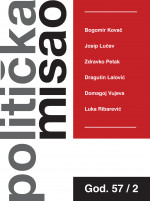Razvoj makroekonomije i rezolutivno-kompozitivna metoda
Development of Macroeconomics and the Resolutive-Compositive Method
Author(s): Josip LučevSubject(s): Economy, Economic history, Methodology and research technology
Published by: Fakultet političkih znanosti u Zagrebu
Keywords: Macroeconomics; History of Economic Analysis; Rationality; Aggregation Problem; Resolutive-Compositive Method; Strpić;
Summary/Abstract: The objective of this text is to demonstrate the plausibility of the use of the Hobbesian resolutive-compositive method as a base for analysis of the history of modern economic thought, and particularly of macroeconomics. Firstly, the importance of the resolutive-compositive method for the works of Dag Strpić is explained. Secondly, the text shows the basic tenets of stylized shifts in economic paradigms (neoclassical economics – Keynesian economics – free-market paradigm) which are reinterpreted here as resolution-composition- reresolution. An interpretation of the intellectual history “after Hayek” is also offered, focusing on Keynesian macroeconomics based on aggregates. The text then explains neoclassical synthesis and the elementary methodological dilemmas it represented through its long integration of Keynes into the mainstream (including the choice of aggregates or aggregated individuals as the basis of macroeconomics). The text follows the complementary relationship of the effects of long-run analysis, the assumption of rationality and optimal free-market results. The state of the economic mainstream at the end of the 20th century and the beginning of the 21st century is then shown – particularly the Lucasian methodological upgrade of Friedman’s ideas and the developed form of this conceptual framework within the Real Business Cycles theory. The renewed dominance of the resolutive element (free-market paradigm) – constituting the idea of a self-regulating market around the perfectly rational individual – leads us into a challenging situation. The reduction to a perfectly rational individual (resolutive maneuver) should not constitute a larger (compositive) whole if such a reduction is unrealistic to an extent that dramatically limits the very usefulness of the theory. Therefore, the conclusion raises the question of applying this idea of predicting crises and formulating responses to them.
Journal: Politička Misao
- Issue Year: LVII/2020
- Issue No: 02
- Page Range: 31-55
- Page Count: 25
- Language: Croatian

